At a Glance
Pros
- Near-identical to iPad Pro 11
- Incredible M1 performance
- iPadOS 15 is well polished
Cons
- Display limited to 60Hz
- No Face ID
- Build quality issues with our sample
Our Verdict
The iPad Air (2022) continues to be the sweet spot in Apple’s tablet collection, offering more similarities to the premium iPad Pro 11 than ever without a dramatic price increase. It does practically everything you’ll need from an iPad, and the M1 chip will continue to deliver high performance for some time to come.
The fifth-generation iPad Air is here, and while it may look near-identical to its predecessor, there are key upgrades within that make it more of an iPad Pro competitor than ever before, sporting key upgrades including Apple’s desktop-focused M1 chipset, 5G connectivity and Apple’s Center Stage camera tech.
With so many similarities between it and the iPad Pro 11, is the iPad Air the sweet spot in Apple’s tablet collection? While it’s not perfect, there’s a lot to love about this year’s iPad Air – as long as it doesn’t creak.
Design & build
The look of the iPad Air is instantly recognisable, sporting the same overall design as the iPad mini, iPad Pro and recent models of iPhone. Unlike earlier models, it has angular corners, but it doesn’t feel uncomfortable to hold in the hand.
In fact, overall build quality feels premium, sporting an anodised aluminium body that feels smooth to the touch. It’s fairly lightweight for a 10.9in tablet too, weighing in at 469g (or 478g if you opt for the 5G variant) and measuring in at an impressive 6.1mm thick.
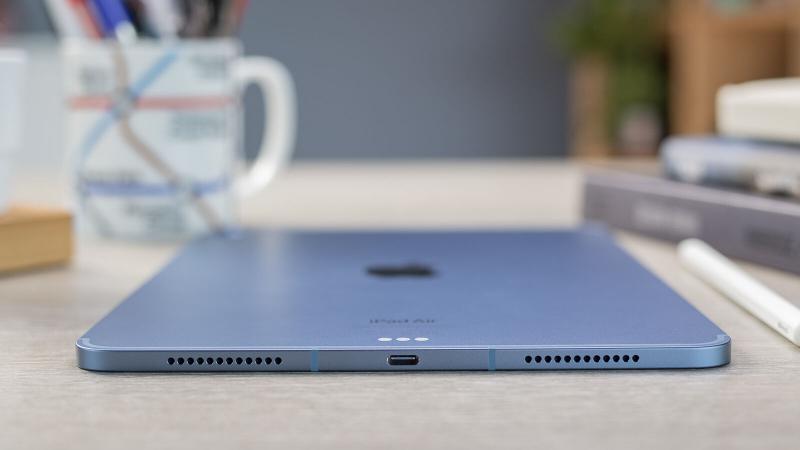
It’s available in five colour options, with four – Space Grey, Starlight, Pink, and Purple – matching the finishes of the latest iPad mini. The Blue colour option, on the other hand, is a totally new colour exclusive to the iPad Air – and the one we got sent for review.
You’ll find volume rockers on the top-left in portrait orientation that change functionality depending on how the tablet. That means that rather than the volume ‘up’ key being at the bottom when held upside down, it’ll be the volume down button as you might expect. It first appeared on the iPad mini, and while it’s not a game-changer, it’s a nice small touch that makes everyday use a little easier.
In other areas, it’s business as usual, sporting a built-in Touch ID sensor within the Power button, and there are stereo speakers mounted on opposite sides. That’s flanked by a USB-C port on the bottom with improved data transfer speeds – but more on that later.
One of the key differences between the iPad mini and iPad Air (aside from the size) is accessory support. Both support the second-gen Apple Pencil, which magnetically attaches to the side of the tablet, but only the iPad Air has the Smart Connector on the rear and compatibility with the Magic Keyboard.

Though expensive and weighty, Apple’s Magic Keyboard essentially turns the iPad Air into a 2-in-1 laptop – and with an upgraded chipset at its heart and split-screen functionality, it performs like one too. I’ve gone into detail about why I love the Magic Keyboard in the past so I won’t focus too much on it here, but if you’ve got the funds, it’s a worthy purchase.
Flexgate
If there’s one complaint I have about the iPad Air sample I’ve been provided with, it’s the rigidity of the backplate.
Though there’s no difference in dimensions compared to other models of iPad Air, the sample provided for review has a noticeable flex on the rear – so much so that I can feel the components touch the plate underneath with very little pressure applied.
I notice it when handling the iPad day-to-day, and it’s something that a handful of (but not all) iPad Air owners have picked up on since launch. On the flip side, I’ve used other samples of the fifth-gen iPad Air that don’t have this issue at all – it seems related to a certain batch of Apple’s latest tablet.

It’s not just something I’ve noticed either; several members of the Tech Advisor team have handled my sample and all remark that you can indeed feel a flex and the components within.
It isn’t noticeable when paired with Apple’s Smart Folio, but at £79/$79, it’s not a cheap case for consumers to pick up on top of a tablet that starts at £569/$599.
I’ve reached out to Apple for clarity on the issue, and I’ll update the review when I get a response.
Display
While the iPad Air comes closer to the iPad Pro 11 than ever before, there remains one distinctive difference: the display. I’m not talking about the mere 0.1in difference between the 10.9in iPad Air and 11in iPad Pro either.
In fact, you’ll find the same 2360 x 1640 resolution and 264ppi pixel density as the equivalent iPad Pro, but it’s missing the special sauce of Apple’s Pro range – ProMotion adaptive refresh rate technology, providing buttery-smooth performance at up to 120Hz.
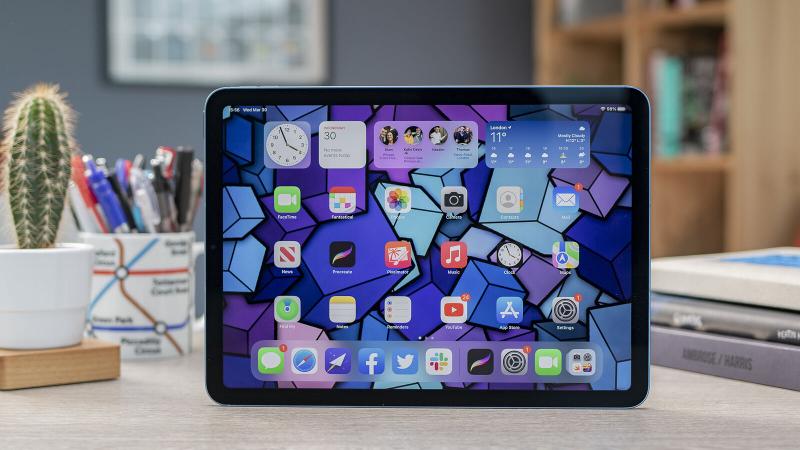
The iPad Air, like the rest of the standard iPad collection, is limited to a standard 60Hz. The result is that games and apps aren’t quite as smooth as they could be, but that’s fairly standard for all but the most premium tablets on the market.
That’s not to say there’s a disappointing viewing experience on offer from the tablet though; I found the iPad Air display to be bright, detailed and vivid whether gaming, watching movies on Netflix or simply writing emails.
There’s also support for HDR10 content with impressive dynamic range, and it’s fairly bright with a max brightness of 471cd/m2 in testing.
In fact, the only real disappointment is that it’s an IPS LCD display and not the superior Mini-LED, OLED or AMOLED, meaning that blacks aren’t quite as deep and inky as those on premium tablets like the Samsung Galaxy Tab S8 Ultra or the iPad Pro 12.9 – though that’s arguably better suited to ‘pro’ users than everyday consumers anyway.
Features & performance
Apple has designed the fifth-gen iPad Air for students, creatives and gamers, all of which need the very best performance at their fingertips. With that in mind, Apple decided to transition the iPad Air line from the A-series chipsets used in the iPhone to the M-series chipsets used in Apple’s iPad Pro and desktop Mac line-up.
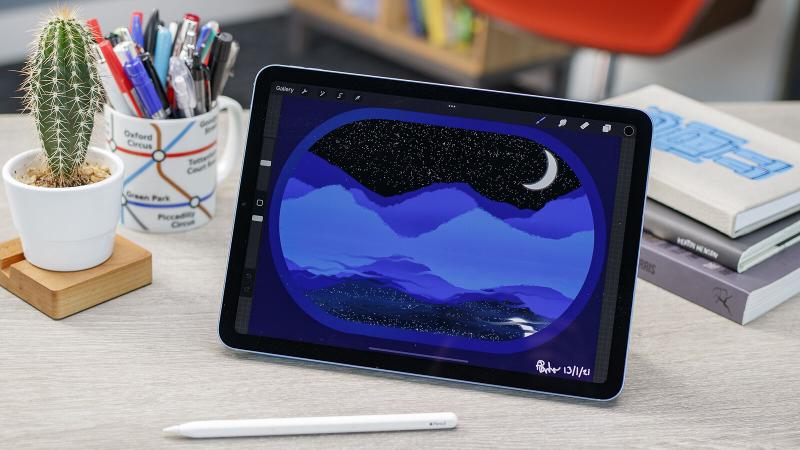
More specifically, the iPad Air features the same Apple M1 chipset as not only the top-end iPad Pro range, but Mac desktops including the MacBook Air, Mac Mini and 24in iMac, with 8GB of RAM and 64/256GB of storage to play with.
Apple claims that this represents a 60% boost to the CPU and ‘up to’ 2x performance in the graphics department, and that is largely backed up by our benchmark results.
Compared to the iPad Air 4, the new iPad offers significant performance gains across the board, with the real limitation on graphics being the 60Hz refresh rate of the standard Liquid Retina display. For those that want high framerate iOS gaming, the iPad Pro 11 may be a better – albeit much pricier – option.
It’s also much more powerful than most of the Android competition in the CPU department, offering over double the processing power of Samsung’s Galaxy Tab S8 Ultra utilising Qualcomm’s top-end Snapdragon 8 Gen 1, though the high refresh rate display does allow the competing chipset to flex its muscles in the graphics department.
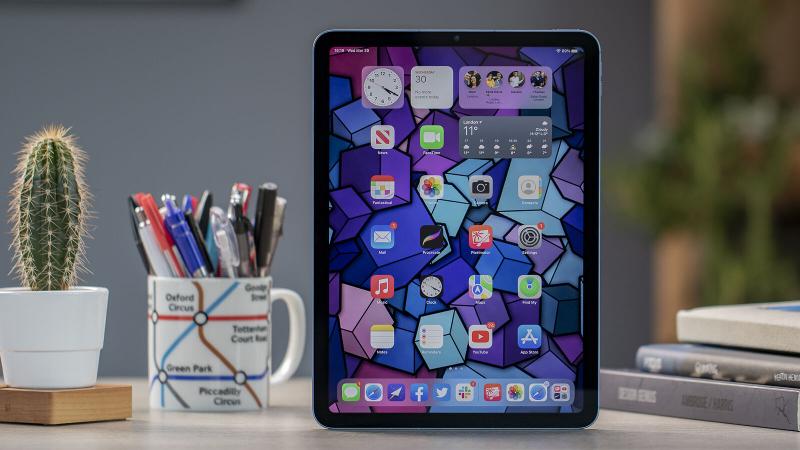
Some might argue that such a powerful chipset is overkill in a tablet, but it’ll allow the iPad Air to continue performing at its best for years to come as developers begin to take advantage of the desktop-level performance on offer.
You can see how the iPad Air 5 compares to the competition in our full benchmark breakdown below. Spoiler: it’s powerful!
As you might expect, that translates to a blisteringly fast tablet experience regardless of what you’re up to.
Games run exceptionally smoothly, albeit at a capped 60fps, and it’s great for photo editing too, with extra power translating to real-time effect previews and very little, if any, load times when applying filters and other effects.
It’s also a boon for content creators, with a new iMovie update rolling out that’ll further help create complex videos without much effort, and you can expect faster render times this time around too.
It can even handle running multiple apps at once using the multi-tasking functionality, complete with drag-and-drop functionality. That’s great for students – especially when combined with Apple’s Magic Keyboard, which essentially turns the tablet into a 2-in-1 laptop.
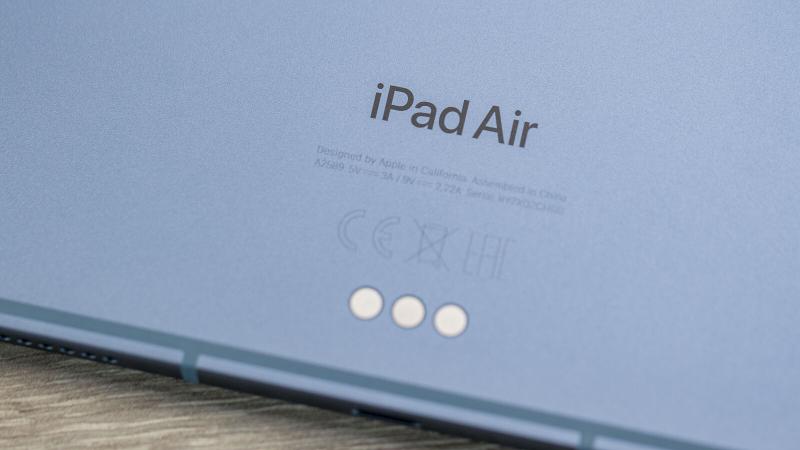
Performance aside, there have been improvements to the tablet’s USB-C port, offering USB-C 3.1 Gen 2 data transfer speeds of up to 10Gbits per second, up from 5Gbits per second on its predecessor.
There’s also upgraded 5G connectivity, up from 4G LTE, if you opt for the cellular model – though the price of the cellular model has increased to reflect this improvement, so tethering may be the better option if you don’t intend on using the tablet away from Wi-Fi that often.
You’ll also find Wi-Fi 6 and Bluetooth 5 support, and security once again focuses on the Touch ID-enabled Power button with no Face ID in sight. That’s one of the few perks left exclusive to the iPad Pro range.
Camera
While cameras on tablets generally aren’t as interesting as their smartphone brethren, Apple has upgraded the front-facing camera on the iPad Air 5 to match the rest of the iPad range.
That means the latest iPad Air sports a 12Mp ultra-wide front-facing camera, making it an excellent choice for group selfies, but that wasn’t the main reason behind the upgrade. Instead, it was to facilitate Apple’s Center Stage technology, which makes video calling – a popular feature on tablets – much easier.

The idea behind the tech is to analyse the front-facing camera and automatically zoom into your face, allowing you to place the iPad on a surface and move around a room while chatting without the need to constantly move the tablet.
Center Stage tech
It’s not new tech, available on key rivals like the Facebook Portal Go and Amazon’s Echo Show 10, but it is handy to have nonetheless.
It plays nicely not only with FaceTime but third-party apps like Zoom and Microsoft Teams too, though you can’t seem to activate it within the Camera app itself. The ability to record videos using the tech would’ve been a nice touch.
Quality-wise, the 12Mp camera is surprisingly detailed in ideal lighting conditions, with decent exposure and great colour accuracy allowing for great quality selfies, though the f/2.4 aperture means it’s not quite as performant in low-light conditions.
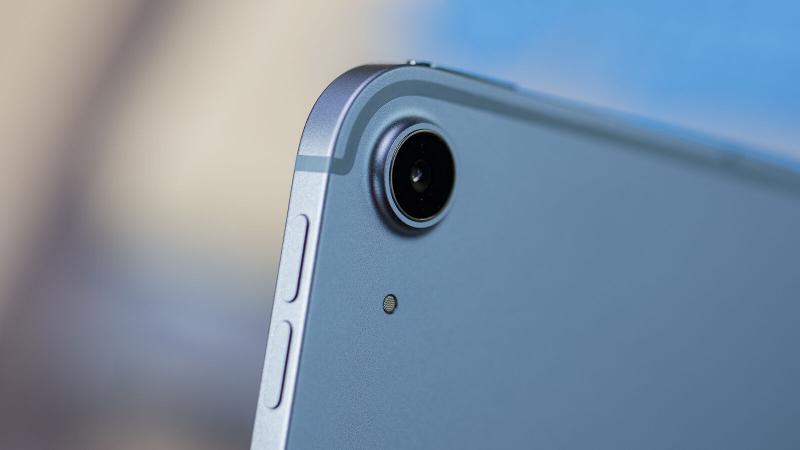
On the rear of the iPad Air you’ll find the same 12Mp f/1.8 snapper as its predecessor, with no real change in hardware or software capabilities to note. Like the front-facing camera, it’ll suffice for everyday snaps, but it’s not going to replace an iPhone 13 Pro Max anytime soon.
Battery life & charging
Battery life remains consistent despite the uptick in performance, with Apple’s claimed 10-hour battery life ringing true in everyday performance. While that doesn’t sound that long, more casual users can stretch that usage across multiple days – I certainly didn’t feel the need to top up the iPad Air every day like my iPhone.
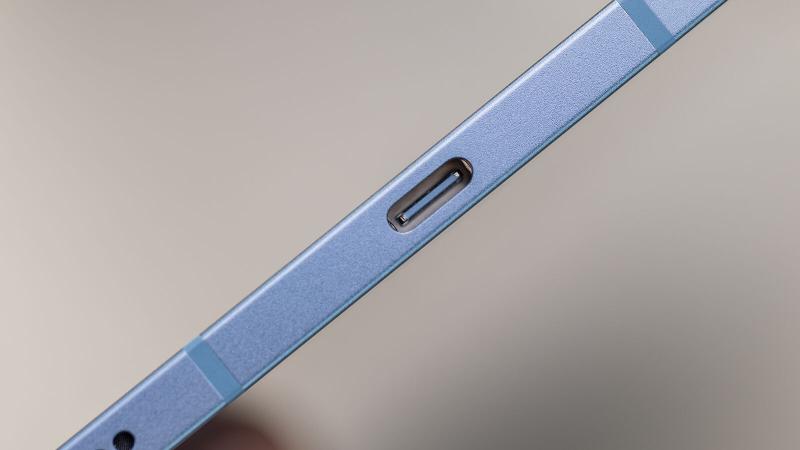
There’s also fast charging support on offer that’ll help reduce the amount of time you spend waiting for the iPad to regain charge. It’ll accept a maximum of 20W of power, but unlike the iPhone, you’ll get a 20W charger in the box – no need to fork out for additional chargers here.
Using Apple’s 20W charger, you can expect 25% charge in 30 minutes. It’s not quite as fast as some smartphones, but considering Samsung’s top-end Galaxy Tab S8 Ultra managed 29% in 30 minutes – the fastest in our tests to date – it’s fairly fast for a tablet.
Software
The iPad Air ships with iPadOS 15.4 out of the box, Apple’s latest version of its tablet-optimised operating system. While there have been strides on the Android side of things of late with the mention of Android 12L for big-screen tablets, Apple’s iPadOS is still comfortably the most capable and most polished tablet OS available in 2022.
The main strength of iPadOS is the huge library of apps and games available from Apple’s App Store, and unlike Android rivals that can use scaled-up mobile apps, all iPad apps are optimised for the big screen. That means you’ll get a better experience in apps, making the most of the screen space available with UI tweaks and other features.
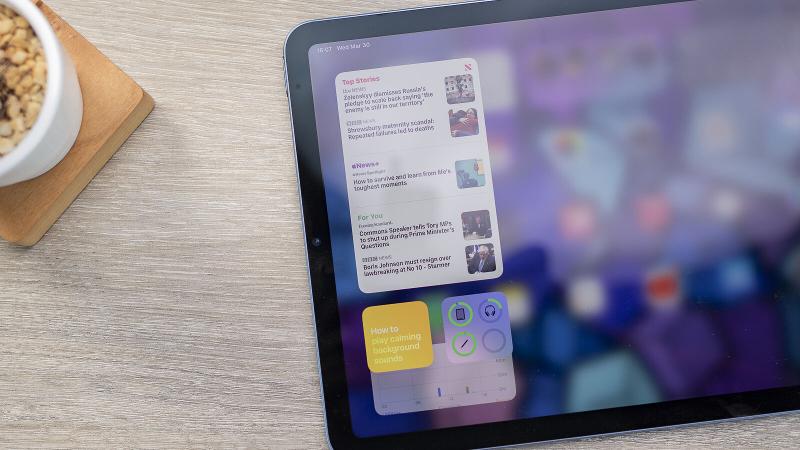
There’s also a better range of apps available for creatives and video editors with pro-level apps like Procreate and LumaFusion Pro available to download.
There are also multitasking features that let you run multiple apps on-screen at the same time, complete with drag-and-drop functionality, and new features in iPadOS 15 allow you to quickly take notes from anywhere on the iPad, enables the ability to copy and paste text from photos within your Photos app and much more.
Simply put, it’s a versatile bit of software with great app availability and a high level of polish – there’s a reason why iPads have been so popular for years, after all.
Price
The fifth-gen iPad Air starts at the same $599 as its predecessor in the US, but it’s actually £10 cheaper in the UK at a reduced £569. That’ll net you 64GB of storage, with the price increasing with larger storage capacities and 5G connectivity. Here’s how much the entire range costs:
- iPad Air (64GB, Wi-Fi): £569/$599
- iPad Air (256GB, Wi-Fi): £719/$749
- iPad Air (64GB, Wi-Fi & Cellular): £719/$749
- iPad Air (256GB, Wi-Fi & Cellular): £869/$899
For context, the iPad Pro 11 with the same M1 chipset as the iPad Air starts at £749/$799, representing great value for money if you don’t need Face ID or ProMotion display tech.
If you’re interested in picking one up, the iPad Air is available to buy from Apple alongside popular retailers like Amazon and John Lewis in the UK and Best Buy in the US.
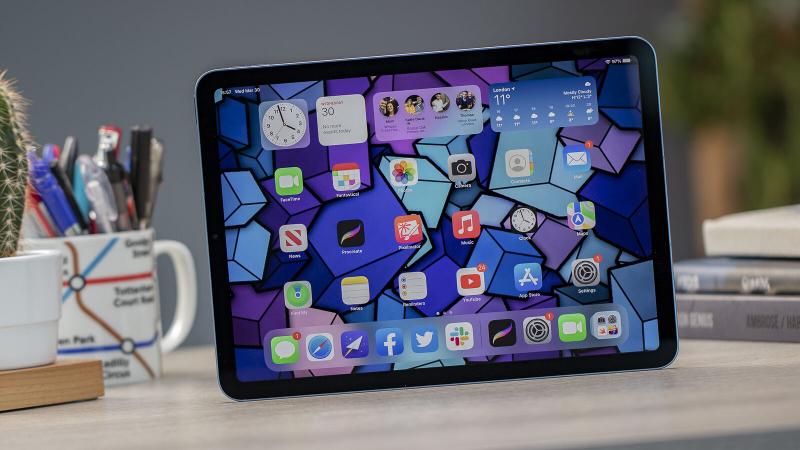
Verdict
The iPad Air remains the sweet spot in Apple’s collection; it sports an industrial design that looks great and feels good in the hand, offers iPad Pro-level productivity with the inclusion of a desktop-level M1 chipset and full compatibility with the premium Magic Keyboard – something that can’t be said of any other non-Pro iPad.
The Apple Pencil 2 support remains solid too, making for a capable tablet for students, gamers and even creatives that feel they won’t make use of the ProMotion display on offer from the (near-identical but more expensive) iPad Pro 11.
There are also the added benefits of 5G connectivity and Apple’s Center Stage camera tech, bringing the iPad Air in line with the rest of Apple’s tablet collection.
iPadOS 15 is another strong point, offering not only a large library of apps fully optimised for the 10.9in display but smart features like split-screen multitasking, dictation and even the ability to copy and paste text from within images, making for a capable tablet that’ll do practically anything you need without complaint.
There are issues around build quality with my sample, but I’m confident this is a manufacturing issue limited to a small batch of iPads – I’ve not noticed it on any other fifth-gen iPad sample I’ve handled – and if you do find your backplate flexes, you’ll hopefully be able to get a replacement at the Apple Store.









